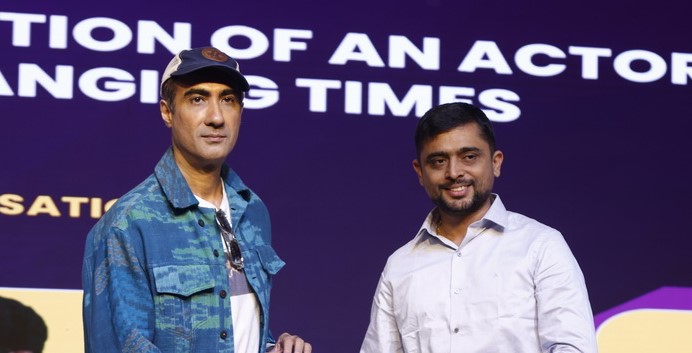The India Web Fest Season 6 witnessed a special set of individuals coming in from different facets of the entertainment space, as they came together to talk about some burning topics that shape the way the industry functions.
One of the more important topics that were being discussed was that of the evolution of an actor in changing times and to be discussing the same, we had the presence of Indian actor Ranvir Shorey, as the session was being moderated by Mr. Subhojit Ghosh.
Here are some excerpts from the conversation-
Subhojit: Of course Sir, everyone has been buzzing about Bigg Boss and everything so far, I wanted to understand that if you had to sum it up in a line or two – your entire journey in Bigg Boss and once you came out, did you get an opportunity to see some of the episodes?
Ranvir: Thank you very much for having me. Thank you, IWMBuzz, for inviting me to this platform. It’s my honor and privilege to be here with all of you today in this esteemed company.
Yes, Big Boss has been a significant turning point in my life. Whether it was positive or negative, I am still figuring that out. To sum up my experience in a line or two, I would say that when I was younger, my mother used to teach me, “Look before you leap, think before you speak.” So, before leaping into a project, I think you should think twice.
Having said that, it’s been a huge learning experience for me, and the learnings are something I am continuing to come to terms with.
Subhojit: So Sir, diving deep into the topic we have with us now is of course the evolution of an actor with changing times, and you have been the example of that where you started at a time when the mediums were limited and there was no OTT to now. So, I will club two questions, so how did you adapt to that change and what would be your message to those actors or performing artists who want to adapt to the changing time but are finding it difficult to do so?
Ranvir: Yeah, you’re right. I started my entire career, including behind the camera, and that’s a good 30 years. When I began, we used to hear about things we’re seeing today, like the democratization of media and entertainment. A time was predicted when everyone would be a filmmaker, journalist, actor, or musician. Back then, these were just predictions for the future.
At that time, I had no interest in acting, but I was drawn to filmmaking, which is why I enrolled for a diploma at St. Xavier Institute of Communication in Film and TV. That education facilitated my entry into television, where I began working behind the camera. Then, we saw the advent of the internet and mobile devices.
About 10 years later, when I started taking acting seriously, I went on to do another course at the Digital Film Academy in New York, which focused on digital filmmaking. That diploma was aimed at how, with the rise of the internet, a person could singularly conceive, create, produce, post-produce, distribute, market, and monetize content on their own.
Flash forward another 10 years to my time on Big Boss, where I spent a lot of time with today’s digital stars—people who are big on YouTube, Instagram, and other platforms. They’re very successful, and I saw the ideas I had studied and heard about come to life. Today, we witness the complete democratization of the audio-visual medium.
I once had a profound thought, which I’d like to share here again: the audio-visual medium is the new writing. That’s the kind of impact it’s having on human evolution and psyche. From simple things like keeping a record—now we can make a video record of an idea instead of writing it down—to communication, where I can send a video message instead of a text. And, of course, there’s entertainment.
We live in a time where the audio-visual medium has been democratized to a great extent, and actors have to adapt to this era. As you mentioned, the idea of a short film has evolved—now, a short film could be 30 seconds or a minute and a half, like Instagram Reels or YouTube Shorts. In just 90 seconds, you have to engage, entertain, and reward the audience. I believe the evolution of an actor has to take this direction into account.
Watch the full video below-
Presented By: Havas Play
Powered by: Applause , Epic On , OTT Play
In Association with: Shemaroo
Partners: One Digital Entertainment , Kaans , White Apple
#IndiaWebFest #IWMBuzz #OTTconclave

